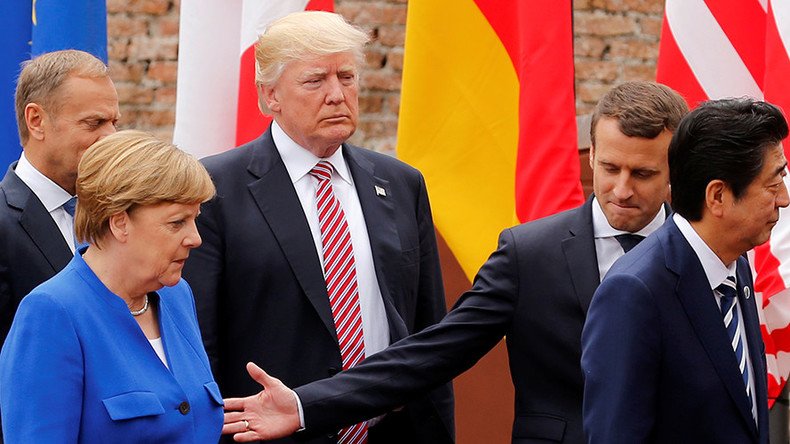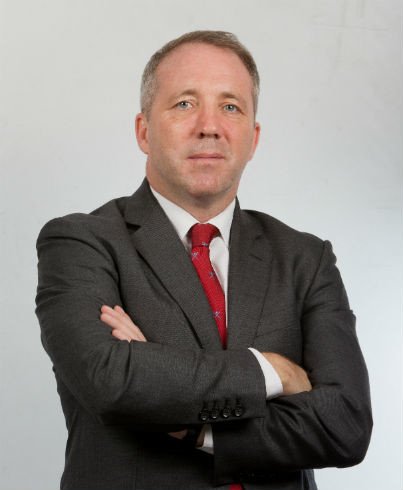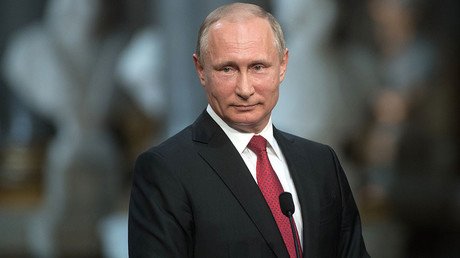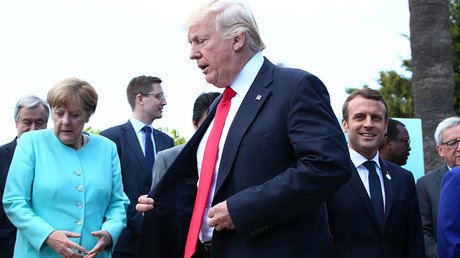Trump’s battle with the European 'old order' is just old fashioned politics

We’re five months into Donald Trump’s rollercoaster presidency, Brexit is rocking the foundations of the EU, and Islamist terrorism threatens our way of life – the old order is crumbling. There is a new ideological conflict, but who are the combatants?
«There's something happening here; What it is ain't exactly clear.» -For What It's Worth, Buffalo Springfield 1967
This lyric, written 50 years ago about another time could apply to our world now. What we understood about the sixties revolution after it happened was that it was a reaction to a deep unhappiness with the established order that had brought two world wars. People didn’t know what exactly they wanted, but they certainly didn’t want what they had come to see as normal.
Now, five months into Donald Trump’s America, as we watch Brexit threaten the foundations of the European Union and stand appalled at increasingly nihilistic Islamist terrorism it is clear something is happening. The old order is crumbling. That’s easy to interpret. The difficult part is who is opposing who? It is a fast emerging conflict, but broadly it is between opportunist, populist, revanchist and nationalistic politicians and their followers against the ancient regime of liberal, consensus leaning, globalist internationalists.
President Trump is the standard bearer for the first group, but he has fellow travelers in Britain and across Europe. This, let us call it a movement, is not slavishly committed to political correctness or multiculturalism. Russia is being connected to Trump by the Western media. But a lot of this is down to the fact that Vladimir Putin, too, refuses to kow tow to the second group.
For the last 30 years liberal, consensus driven, globalist politics dominated the rich, influential power blocs. The United States and the European Union (EU) through the 1980s and 1990s dominated world politics. And the two power blocs, intertwined with the military alliance of NATO and supported by the United Nations formed one all dominating, usually cohesive conglomerate.
The EU, though it expanded to 27 countries, and was supposed to represent a homogenous group was and is dominated by an axis of Germany and France. The EU will not deviate toward policy that adversely affects the interests of this axis.
The United Kingdom stood up to the French-German axis, and now it has left. Russia, re-emerging with confidence, would not be intimidated. But all this the EU and its dominating powers could handle. Then Trump became US President. This wild card has blown all the old certainties away.
Rapidly the accepted pillars of global politics have crumbled. The old way of doing things, driven by the liberal democracies and leaders like German Chancellor Angela Merkel was stuttering. A week ago, in a Bavarian Beer Hall, Angela Merkel was driven to say: “The times when we could completely rely on others are, to an extent over.”
Merkel supporters – and even her internal enemies – nodded at her bellicose language.
She was saying that Trump’s America, the ‘want away’ British and the cynical Russians and everybody else can’t be relied on anymore. They disagree, and they must be wrong. There is a general acceptance in the global, opinion setting liberal media that these three power blocs have wronged the EU power brokers.
This scolding from Merkel was inspired by Trump’s tour through Europe when he did some scolding of his own.
At a G7 meeting in Sicily Trump criticized America's traditional European allies over NATO obligations and made clear that he was willing to go it alone on climate change and trade.
The Old Guard, led by Germany its close EU colleagues, are characterizing Trump, the British and other nations and political movements who oppose them as right wing and reactionary. The language of their criticism carries innuendo. Those who oppose them are violent, racist and backward thinking. The narrative from the European leaders in the EU to the departing British has been that they are a nation of fools led by inward looking politicians.
America too is, they say, a misguided country led by a backward, isolationist leader in Donald Trump. These views are strongly supported by large swathes of the media. The Western media is predominantly liberal, leftist and supportive of consensus politics.
I contend that it is the consensus, liberal politicians that are out of step. It is they who are suddenly seen to be tied to an out-of-date and exhausted ideology. The reaction of the European democracies to Trump indicates history has overtaken them.
Trump said at a NATO meeting in Brussels at the end of May “NATO members must finally contribute their fair share and meet their financial obligations.”
And it was met with shock.
Trump has been castigating NATO and the unwillingness of America’s partners to spend the required 2 percent of GDP on defense for well over a year now. He has driven it home time after time.
I was in Washington when he told Merkel to her face about his concerns.
When Trump last week pulled out of the Paris Climate Accord there was a worldwide shrill revulsion.
Belatedly some thinkers and writers have come to see that the reaction to this was over the top. Again, amazingly, many world leaders and commentators have not been listening to what Trump has been saying. Or why he is saying it.
He has opposed this deal since he rose to become a Presidential contender a year ago.
His castigation of NATO is not some mindless attack on old allies. It is a deep belief that America is being taken advantage of. America First he says and he means it.
His exit from the Paris deal is down to the fact that he believes it is a bad deal for America. And many agree with him.
And we get to back to basic politics. Trump was elected in the Rust Belt of the United States. And Greater Appalachia, a huge neglected, mainly white area in the middle of the United States that has been wonderfully chronicled in the Hillbilly Elegy memoir of JD Vance.
Trump believes the Paris Accord is unfair. It is bad for the US, it is bad for the US coal industry, and it is bad for the working class folk in the middle America states that elected him. And he is out.
When he accompanies his departure with crass and rather inaccurate statements like “I represent the people of Pittsburgh, not Paris,” it allows the intelligentsia to sneer. But it is an ingenious summation. The Paris Accord hurts steel workers in Pittsburgh, so it is out.
To me, this indicates that NATO allies the EU and lots of the world aren’t really observing and analyzing their foe. They aren’t looking at his political base and understanding what he is doing.
He is representing his constituents.
But it also shows that the EU bloc of consensus states, and the liberal intelligentsia and US Democratic Party are so deluded by their own certainty in the rectitude of their beliefs that they can’t appreciate other viewpoints.
This is the classic failing of a bloated and decaying empire – failure to understand and adapt.
And they can’t accept a democratic decision of the US electorate. Trump has been elected leader of the US, and it is he who decided the US couldn’t ‘rely on others’ before Merkel did.
The British have been criticizing the EU for decades. Successive governments have pleaded for reform for decades.
The British too understood that they couldn’t ‘rely on others.' The EU is becoming ever more isolated, and the British, such past masters of global trade are expanding their horizons rather than restricting them.
Germany’s conduct during the post-2008 financial crisis was selfish and uncaring. Led by Merkel, cloaked in collegiate concern, many countries felt that the Germans sold them down the river to protect their banks.
Ireland, Greece, Portugal, and Italy were lumbered with unsustainable debts that will restrict economic growth for decades.
Many critics believe Germany drove the EU response to the financial crisis, demanding cuts and austerity, which led to further stagnation.
And when it comes to his foreign policy Trump is not an aberration, he is the culmination of the US evolution. We can trace the roots of Trump’s nationalist politics to the 2001 attack on the World Trade Center. After the Twin Towers came down, the US came to see foreign intervention, something it had done furtively and ashamedly for decades, as something it would pursue openly and enthusiastically.
It took a vengeful route, with wars on countries like Iraq and Afghanistan that they associated with Islamic extremism.
Like any All-American entrepreneur, Trump took a good idea and improved and simplified it at the same time. Guided by devious but brilliant right wing ideologues like Steve Bannon and Roger Stone, he decided complicated method was not working.
He took this long-standing opposition to Islamic terrorism and simplified it. He says the unfettered movement of peoples through our continents is contributing to terrorism. And with the streets of Europe’s capitals crawling with knife wielding maniacs he is finding many adherents to his beliefs. Trump was one of the first to pledge his allegiance to Britain at the weekend after the attacks in London that killed seven people.
But he drove home his message too.
Whatever the United States can do to help out in London and the U. K., we will be there - WE ARE WITH YOU. GOD BLESS!
— Donald J. Trump (@realDonaldTrump) June 3, 2017
We need to be smart, vigilant and tough. We need the courts to give us back our rights. We need the Travel Ban as an extra level of safety!
— Donald J. Trump (@realDonaldTrump) June 3, 2017
If Trump is constantly in campaign mode, Merkel is in a more immediate political battle. She will face the electorate on 24 September this year.
And Trump bashing seems to be going down well in Germany.
In Germany, 79 percent of people think Trump is bad for international co-operation on climate change, counter-terrorism, and refugees.
The late speaker of the US House of Representatives Tip O’Neill would say all politics is local. Perhaps it still is, but local on a global level.
The statements, views and opinions expressed in this column are solely those of the author and do not necessarily represent those of RT.














